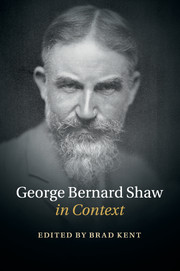Book contents
- Frontmatter
- Dedication
- Contents
- List of illustrations
- Notes on contributors
- Preface
- Acknowledgements
- A Chronology of Shaw's Works
- List of abbreviations
- PART I PEOPLE AND PLACES
- PART II THEATRE
- PART III WRITING AND THE ARTS
- PART IV POLITICS
- 24 Censorship
- 25 Empire and nationalism
- 26 Feminism
- 27 Irish politics
- 28 Socialism
- 29 Totalitarianism
- 30 War
- PART V CULTURE AND SOCIETY
- PART VI RECEPTION AND AFTERLIFE
- Further reading
- Index
- References
25 - Empire and nationalism
from PART IV - POLITICS
Published online by Cambridge University Press: 05 October 2015
- Frontmatter
- Dedication
- Contents
- List of illustrations
- Notes on contributors
- Preface
- Acknowledgements
- A Chronology of Shaw's Works
- List of abbreviations
- PART I PEOPLE AND PLACES
- PART II THEATRE
- PART III WRITING AND THE ARTS
- PART IV POLITICS
- 24 Censorship
- 25 Empire and nationalism
- 26 Feminism
- 27 Irish politics
- 28 Socialism
- 29 Totalitarianism
- 30 War
- PART V CULTURE AND SOCIETY
- PART VI RECEPTION AND AFTERLIFE
- Further reading
- Index
- References
Summary
During Shaw's extensive lifetime, the terms ‘empire’ and ‘nationalism’ underwent drastic changes as much in their definition as in their practice. Born just before the Indian Rebellion in 1857 that ushered in the consolidation of the British Empire, Shaw grew up in post-famine Ireland during the first Land Reform Acts and the introduction of Home Rule. As a middle-aged public figure, he was to witness and comment on the British Empire, from the ‘New Imperialism’ of the 1890s to the crises in South Africa, Egypt, India, and Ireland. Reflecting after World War I on the decline of the British Empire and the rise of Soviet socialism and the League of Nations, Shaw willfully imagined a new world order emerging that fit his utopian historical narrative. Despite the range of historical events that marked empire and nationalism in his lifetime, Shaw consistently viewed them through his evolutionary philosophy as stages toward an enlightened federation of states based in socialist principles.
While the early nineteenth century was the great age of European nationalisms, marked by the Napoleonic wars and revolutions in Italy, Greece, and Hungary, the later part of the century was the age of imperialism. The change from the ‘informal’ modes of colonisation that began in the seventeenth century to empire is often tied to the period after the Indian Rebellion of 1857, when Westminster assumed direct control over Indian affairs and Queen Victoria was named Empress of India. What came with these changes in procedure and symbolism was a view of centre and periphery as essentially connected by matters of state, not just trade and tradition, so that the early modern process of informal Empire created by settlers and traders passed into that of an Imperialist system where the world was divided ‘into formal colonies and the spheres of influence of the great powers’. Whether it was the ideology of Queen Victoria as a ‘Great White Mother’ in Barbados or the spread of English education in India and Ireland, the increasing use of racial and national symbols marked the shift in methods of rule. Similarly, the pursuit of colonies by other European nations as a form of national prestige culminated in the meeting of the Berlin Conference in 1884, at which the European powers conferred agreements on the expansion of settlements and trade in Africa.
- Type
- Chapter
- Information
- George Bernard Shaw in Context , pp. 207 - 214Publisher: Cambridge University PressPrint publication year: 2015

